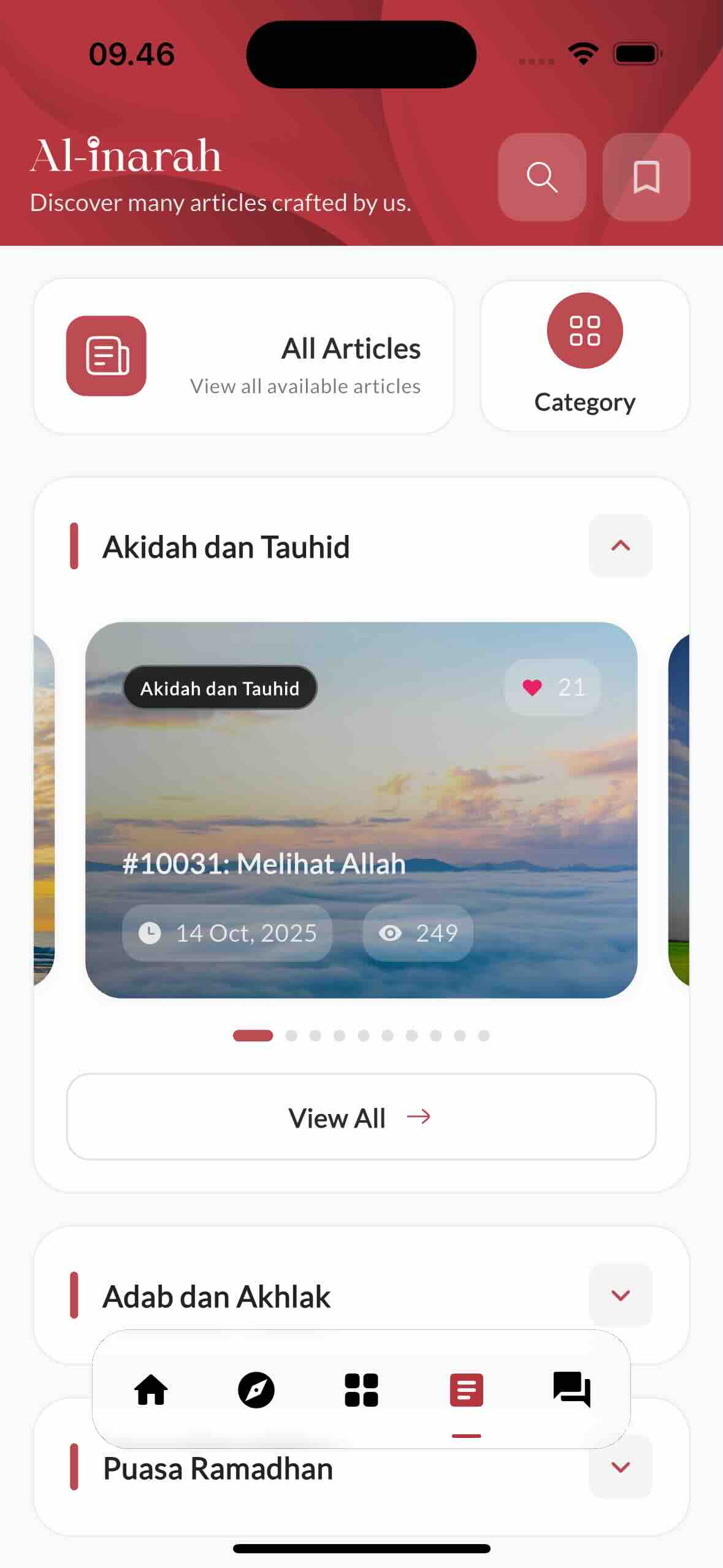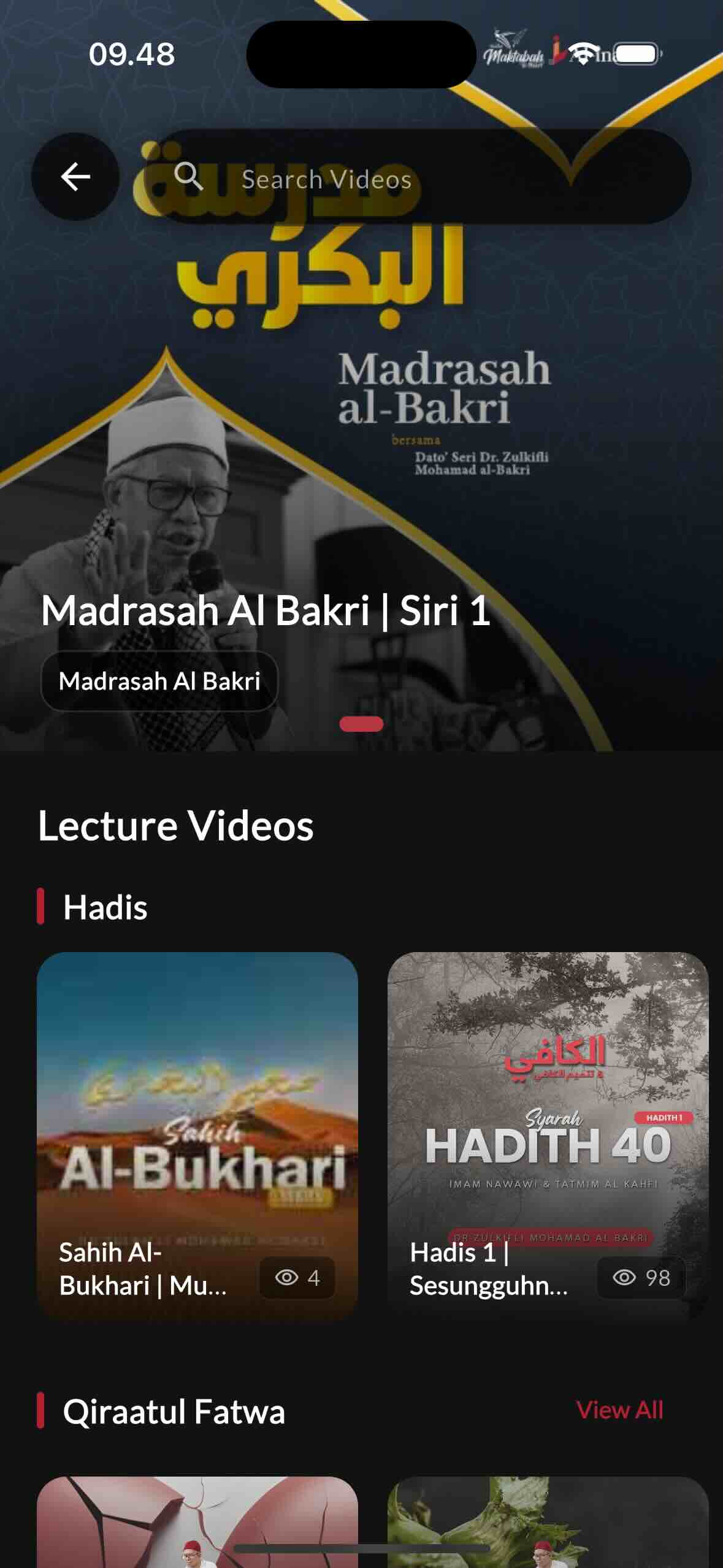Aplikasi Rujukan Islam Terbaik untuk Anda
Akses lebih 10000 soalan, 500 video, dan 100 e-book dari Al-Inarah. Dapatkan panduan Islam yang sahih terus di hujung jari anda.

Al-Inarah
Assalamualaikum, Dr Zulkifli Mohamad Al Bakri

Dipercayai oleh ribuan pengguna
Semua yang anda perlukan dalam satu aplikasi
Platform rujukan Islam terlengkap dengan 10,000+ soalan & jawapan, video pengajian eksklusif, dan e-book premium.

AI Inarah - Chatbot Pintar Islam
Bertanya soalan Islam dengan mudah menggunakan AI Inarah. Chatbot pintar kami dilatih dengan ribuan soalan & jawapan daripada Dr. Zulkifli Mohamad Al-Bakri dan ulama terpilih.
Respons Pantas & Tepat
Dapatkan jawapan Islam yang sahih dalam beberapa saat sahaja. AI kami dilatih dengan rujukan yang terpercaya.
Rujukan Dalil Lengkap
Setiap jawapan disertakan dengan dalil dari Al-Quran, Hadis, dan pendapat ulama muktabar.
24/7 Sentiasa Bersedia
Tanya soalan bila-bila masa, di mana sahaja. AI Inarah sentiasa bersedia membantu anda.
Ciri-ciri Utama
Aplikasi Al-Inarah menawarkan pelbagai ciri untuk membantu anda dalam pembelajaran agama.
AI Chatbot
Tanya soalan agama dan dapatkan jawapan segera daripada AI yang dilatih dengan rujukan sahih.
Qiraatul Fatwa
Akses ribuan fatwa dari Ulama terpercaya dalam pelbagai topik agama.
Ibadah Harian
Panduan lengkap untuk ibadah harian termasuk doa, zikir dan wirid.
Sesi Pengajaran
Sertai sesi pengajaran langsung dan tonton semula rakaman kuliah agama.
Al-Inarah Pro
Akses kandungan premium termasuk e-book eksklusif dan video khas.
Akses Luar Talian
Muat turun kandungan dan akses tanpa sambungan internet.
Apa kata pengguna kami
Beribu-ribu pengguna telah memanfaatkan aplikasi Al-Inarah untuk meningkatkan ilmu Islam mereka.
Harga yang berpatutan
Pilih pelan yang sesuai dengan keperluan anda dan mulakan pembelajaran Islam hari ini.
 Pelan Premium
Pelan Premium

RM4.99
Akses penuh kepada semua kandungan premium Al-Inarah.
- Akses kepada 10,000+ soalan & jawapan Islam
- Video pengajian eksklusif tanpa had
- Perpustakaan e-book premium lengkap
- Kemas kini kandungan baharu setiap minggu
Soalan Lazim
Tidak jumpa jawapan yang anda cari? Sila hubungi kami.
Apakah aplikasi Al-Inarah?
Al-Inarah adalah aplikasi rujukan Islam yang menyediakan akses kepada soalan-soalan agama, video kuliah, dan e-book dari Ulama yang dipercayai.
Adakah aplikasi ini percuma?
Ya, aplikasi Al-Inarah boleh dimuat turun dan digunakan secara percuma. Kami juga menawarkan versi Pro dengan ciri-ciri tambahan.
Apakah ciri-ciri Al-Inarah Pro?
Al-Inarah Pro menawarkan akses kepada kandungan premium termasuk e-book eksklusif, video khas, dan akses luar talian tanpa had.
Bolehkah saya menggunakan aplikasi tanpa sambungan internet?
Ya, anda boleh memuat turun kandungan dan mengaksesnya secara luar talian. Ciri ini tersedia untuk pengguna Pro.
Siapakah Ulama yang dirujuk dalam aplikasi ini?
Kami merujuk kepada Ulama-ulama terpercaya dan berkredibiliti dalam bidang ilmu agama Islam.
Bagaimana cara saya bertanya soalan?
Anda boleh menggunakan ciri AI Chatbot untuk bertanya soalan atau menghantar soalan melalui borang dalam aplikasi.
Adakah kandungan dikemas kini secara berkala?
Ya, kami sentiasa menambah kandungan baru termasuk soalan, video, dan e-book setiap minggu.
Bolehkah saya berkongsi kandungan dengan rakan?
Ya, anda boleh berkongsi artikel, video, dan rujukan dengan rakan-rakan melalui pelbagai platform media sosial.
Bagaimana cara mendapatkan bantuan?
Anda boleh menghubungi kami melalui e-mel di support@al-inarah.com atau menggunakan borang bantuan dalam aplikasi.
Muat Turun Aplikasi Al-Inarah
Dapatkan aplikasi Al-Inarah sekarang dan mulakan pembelajaran agama anda hari ini.



